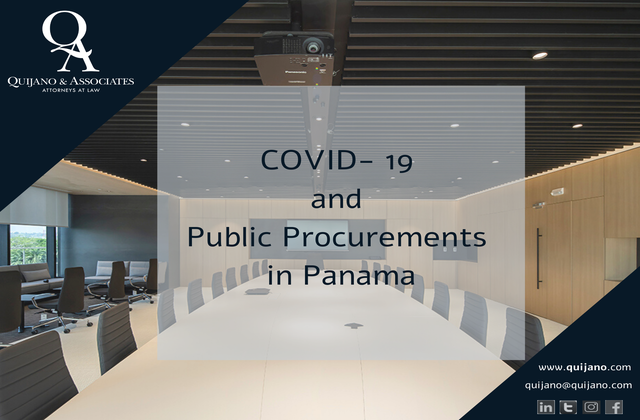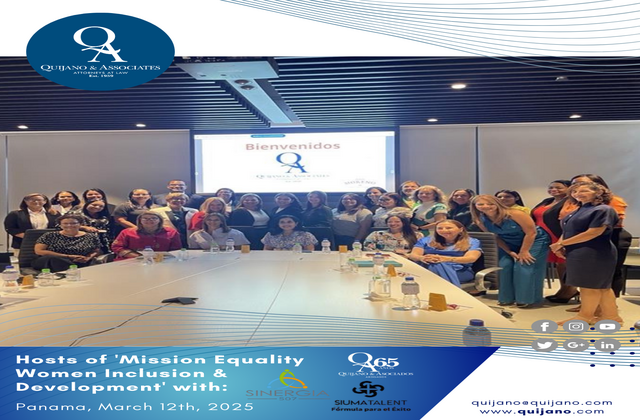COVID- 19 and Public Procurements in Panama

Officially declared by the World Health Organization (WHO), the pandemic of the COVID-19 outbreak, which has impacted many nations, affecting the health of citizens, the economy and the finances of all infected countries, which has led them to take extraordinary measures in the face of this event rarely seen by humanity.
Despite the fact that as we have mentioned, this situation has rarely been experienced by humanity, in article 79 of Law 22 of June 27, 2006, a procedure is already contemplated to efficiently address the current situation and that public institutions can acquire goods, works and / or services with a special expedited procedure.
Given the serious public health situation Panama is facing, our Government through Cabinet Resolution No. 11 of March 13, 2020 declared the “State of National Emergency”, having the effect that through Executive Decree No. 507 of 24 March 2020, modified by Executive Decree No. 513 of March 27, 2020, it was decided to suspend all the terms of the administrative processes followed by different Government institutions, in order to combat the spread of the virus among the population.
Because of the foregoing, the following acts have been suspended: contractor selection (that have not passed the proposal submission stage), the claims, appeals, impugnments and the contracts for works, goods and services
With this “partial” suspension, since we have to mention that Executive Decree No. 513 of 2020 keeps in force those acts of contractor selection that are aimed at contracting works, purchasing equipment, goods and hospital supplies; medicines; and other goods, services or articles that have passed the stage of presentation of proposals, but in the same way, it confronts us with a great economic imbalance, due to the considerable delays that have indeed occurred and will continue occurring in summoned contractor selection processes, suspended contracts and/or those contracts that cannot be executed due to force majeure reasons or fortuitous events.
Despite it all, both the current regulation and administrative acts, force us to ask ourselves some questions such as:
- Can bidders request compensation for expenses incurred in the event that the institution decides to reject the proposals submitted and cancel the act, after being awarded, based on the current situation?
- Are the contractors empowered to invoke the “economic balance of the contract” once the decreed suspension is lifted?
- Does the decreed suspension give the contractor the right to request extensions and / or economic addenda to the contract?
- Should the State bear with all the contractual economic repercussions that are generated due to the State of National Emergency?
Regarding some of these questions, we are not sure on oficial institutions’ position, but we can assure that they will generate different legal opinions regarding possible equitable solutions. Additionally, as from this very moment we could assure that some claims derived from these pretensions will end up even being sued at the Third Chamber of Administrative Litigation.
As we have mentioned, our legal regulations regarding Public Procurement in its article 79, develops the “special procedure for emergency acquisitions”, and establishes the steps and requirements for the acquisition of goods, services or works under the premise of the declaration of emergency. Said declaration must establish the total amount authorized for special contracts and the period within which those contracts can be made.
Resolution No. 11 of March 13, 2020, established the amount of fifty million dollars (US$ 50,000,000.00) and the term of one hundred and eighty (180) calendar days for the execution of these measures; and additionally, assigned the responsibility to the Ministry of the Presidency to administer and authorize the resources, assigned items and their transfers.
In the aforementioned article 79, the parameters for the acquisition of all goods, services and works are determined, however, it is highlighted that for the acquisition of water and food for immediate consumption, the bail filing will not be required, and the contractor must guarantee (through the respective contract) the obligation to respond for the defects of the acquired goods and establishes that as a general rule, the payment must be made after the delivery of the goods to avoid non-compliance.
Likewise, when goods that are not accessible in the local market are required, public institutions are empowered to acquire them from non-national companies, but they must register the company in the Proponents Registry of the Electronic System for Public Procurement.
It is not less important to mention the commitment that public institutions have to consult the Electronic Catalog of Products and Services and verify if the required products or services are included or not in said Catalog, as well as we must mention the obligation that public institutions have to present the respective report to the Cabinet Council once the term indicated by the cabinet resolution that declared the emergency has concluded, which will be published in the Electronic System of Public Procurement “PanamaCompra”.
Another important measure taken by Panamanian Government, which innovates in public procurement, gives speed and prevents infections, to face the crisis caused by this pandemic, is the issuance of Resolutions No, 509-B and 509-C, both of March 13, 2020, issued by the Office of the Comptroller General of the Republic, who in the exercise of his functions exceptionally authorized the presentation of electronic performance fulfillment bonds for the acquisition of goods and services derived from the Special Procurement Procedure of Emergency and Exceptional Procedure for Obvious Urgency.
For more information or related legal advice, Quijano & Associates has a professional expert team who are willing to advise you and clarify all your doubts in this regard.




